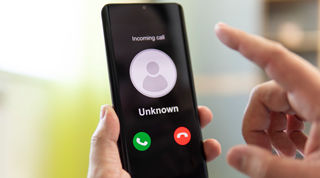At American Community Bank, we take our customers' safety and information security very seriously, and your trust in us is extremely important. That's why we are offering you these resources to help you better understand how we, together, can best protect you and your accounts. Each of the tiles below give a little detail on some of the most common ways that fraudsters try to scam you. Click on each topic to learn a little more on how each scam works. Overall, the biggest red flags that most scams have in common are listed here.
Watch for These Red Flags!
 Red Flag #1:
Red Flag #1:
Gift Cards, Mobile Payment Apps, Wire Transfers or Cryptocurrency
Most scams involve some sort of arrangement that results in the victim sending funds to the scammer via gift cards, a mobile payment app, a wire transfer, or with cryptocurrency. This is because these transactions are difficult or impossible to reverse once a victim discovers the scam.
 Red Flag #2:
Red Flag #2:
Urgency/Scare Tactics
Many scams will try to force you to make a quick decision, often using scare tactics, suggesting you must do something immediately to avoid some negative consequence. A hurried choice or action always comes at the expense of rational and reasoned thought. Don’t ever be pressed into making an impulsive decision. Immediate action is rarely necessary in legitimate matters.
 Red Flag #3:
Red Flag #3:
Trust Building
Many scams rely on your willingness to trust the fraudster. Whether it be through an email, text or phone call, the fraudsters will say and do anything to get you to believe that they are who they say they are and get you to go along with their scam. Don’t trust your Caller ID; don’t trust their provided phone numbers; don’t trust their provided links. If you think the communication may be legitimate, YOU can initiate a SEPARATE contact from your end with contact information that YOU source.
Security Tips from the FTC!
I'm a victim. What do I do now?
People whose identities have been stolen can spend months or years, and their hard-earned money, cleaning up the mess thieves have made of their good name and credit record. In the meantime, victims may lose job opportunities, be refused loans, education, housing or cars, or even get arrested for crimes they didn't commit.
If you ever know or suspect that you are a victim of identity theft or any sort of fraud, there are several things you should do.
Steps To Take to Report Identity Theft
- Contact one of the three major credit reporting agencies to report the fraud and request that they place a "fraud alert" on your account
- Equifax = www.equifax.com = 1-800-525-6285
- Experian = www.experian.com = 1-800-397-3742
- TransUnion = www.transunion.com = 1-800-680-7289
- Note: You only need to contact one agency, as they will then contact the other two
- Review your credit reports for other fraud that you may not have found yet
- Contact the police to report the crime and request a copy of the report
- Contact the Federal Trade Commission to make a report
- Contact your bank and let them know
- Contact any business likely to be affected and let them know
- Keep good records of everything you do, when you do it, and whom you speak with
- Visit this page on the FTC website: Recovering From Identity Theft
- Visit this website: www.identitytheft.gov














